Assessment Approaches in Early Childhood Education and Care
VerifiedAdded on 2020/04/07
|12
|2798
|106
Essay
AI Summary
This essay provides a comprehensive overview of assessment practices in early childhood education and care. It begins by highlighting the significance of assessment in supporting young learners' educational progress and outlines various approaches, including the Maori assessment perspective (Kaupapa Maori), learning story approach, and Pacific-based methods. The essay emphasizes the role of assessment in identifying children's understanding, capabilities, and interests, as well as its impact on curriculum development, teacher-family partnerships, and program quality. It delves into the learning story approach, discussing its flexibility and the importance of teacher and parent involvement. The essay also explores Maori and Pacific nations' perspectives on assessment, focusing on cultural norms and the child-centered approach. Reflective practice is examined as a crucial element in informing assessment and planning, leading to improved teaching methods and learner outcomes. Finally, the essay connects these practices to the Te Whariki curriculum, highlighting its bicultural nature and its role in empowering children. Overall, the essay underscores the importance of assessment as a tool for planning and supporting early childhood learning, with a focus on diverse approaches and reflective practices.
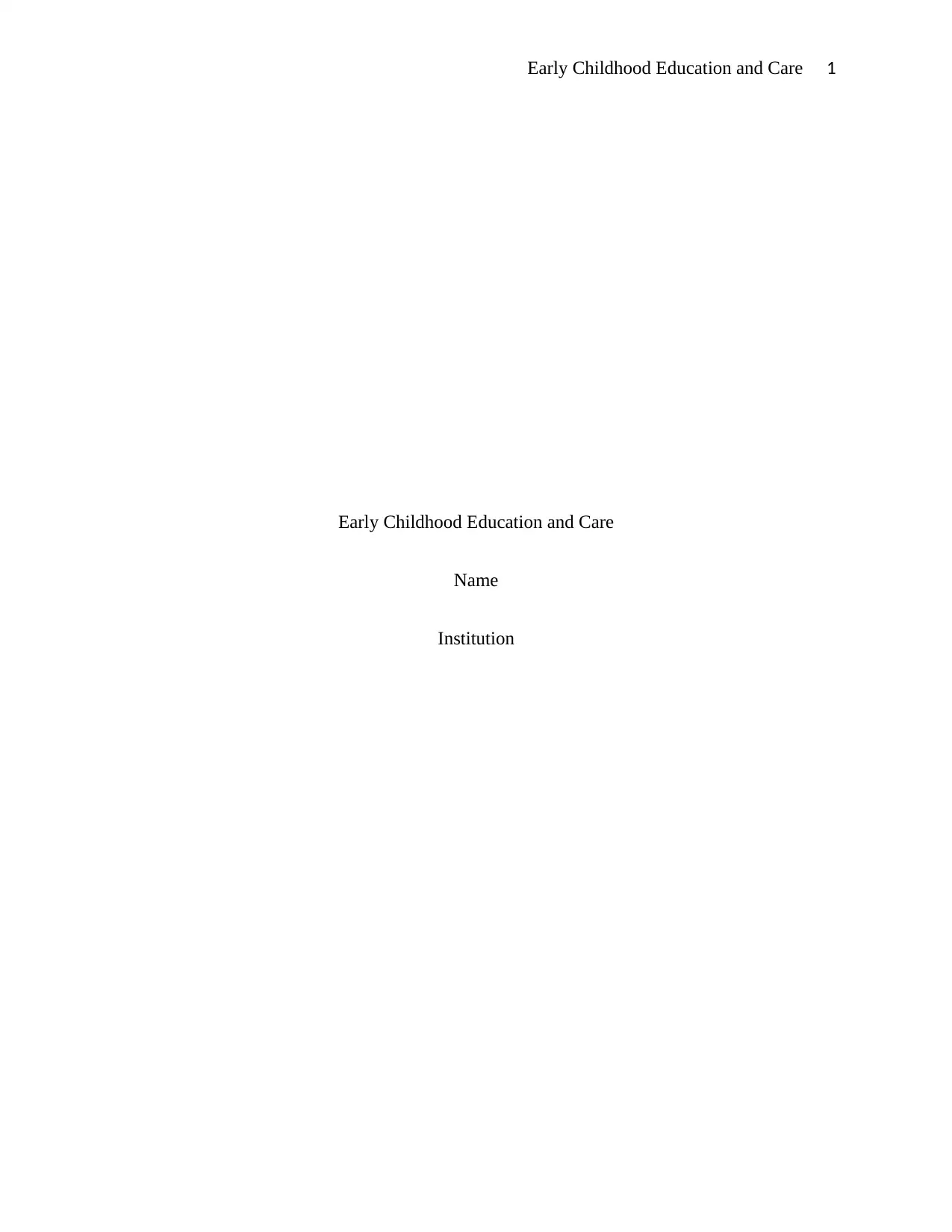
Early Childhood Education and Care 1
Early Childhood Education and Care
Name
Institution
Early Childhood Education and Care
Name
Institution
Paraphrase This Document
Need a fresh take? Get an instant paraphrase of this document with our AI Paraphraser
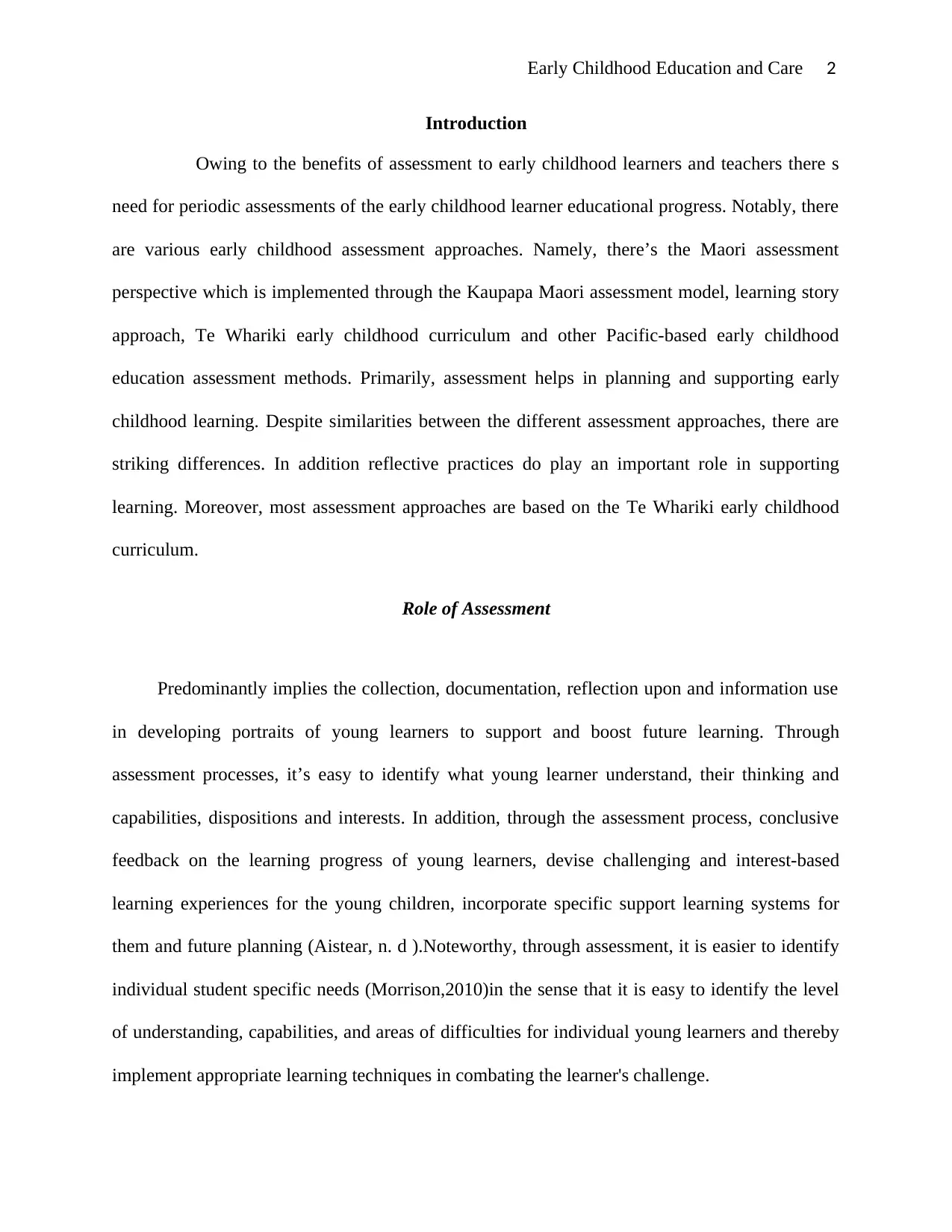
Early Childhood Education and Care 2
Introduction
Owing to the benefits of assessment to early childhood learners and teachers there s
need for periodic assessments of the early childhood learner educational progress. Notably, there
are various early childhood assessment approaches. Namely, there’s the Maori assessment
perspective which is implemented through the Kaupapa Maori assessment model, learning story
approach, Te Whariki early childhood curriculum and other Pacific-based early childhood
education assessment methods. Primarily, assessment helps in planning and supporting early
childhood learning. Despite similarities between the different assessment approaches, there are
striking differences. In addition reflective practices do play an important role in supporting
learning. Moreover, most assessment approaches are based on the Te Whariki early childhood
curriculum.
Role of Assessment
Predominantly implies the collection, documentation, reflection upon and information use
in developing portraits of young learners to support and boost future learning. Through
assessment processes, it’s easy to identify what young learner understand, their thinking and
capabilities, dispositions and interests. In addition, through the assessment process, conclusive
feedback on the learning progress of young learners, devise challenging and interest-based
learning experiences for the young children, incorporate specific support learning systems for
them and future planning (Aistear, n. d ).Noteworthy, through assessment, it is easier to identify
individual student specific needs (Morrison,2010)in the sense that it is easy to identify the level
of understanding, capabilities, and areas of difficulties for individual young learners and thereby
implement appropriate learning techniques in combating the learner's challenge.
Introduction
Owing to the benefits of assessment to early childhood learners and teachers there s
need for periodic assessments of the early childhood learner educational progress. Notably, there
are various early childhood assessment approaches. Namely, there’s the Maori assessment
perspective which is implemented through the Kaupapa Maori assessment model, learning story
approach, Te Whariki early childhood curriculum and other Pacific-based early childhood
education assessment methods. Primarily, assessment helps in planning and supporting early
childhood learning. Despite similarities between the different assessment approaches, there are
striking differences. In addition reflective practices do play an important role in supporting
learning. Moreover, most assessment approaches are based on the Te Whariki early childhood
curriculum.
Role of Assessment
Predominantly implies the collection, documentation, reflection upon and information use
in developing portraits of young learners to support and boost future learning. Through
assessment processes, it’s easy to identify what young learner understand, their thinking and
capabilities, dispositions and interests. In addition, through the assessment process, conclusive
feedback on the learning progress of young learners, devise challenging and interest-based
learning experiences for the young children, incorporate specific support learning systems for
them and future planning (Aistear, n. d ).Noteworthy, through assessment, it is easier to identify
individual student specific needs (Morrison,2010)in the sense that it is easy to identify the level
of understanding, capabilities, and areas of difficulties for individual young learners and thereby
implement appropriate learning techniques in combating the learner's challenge.
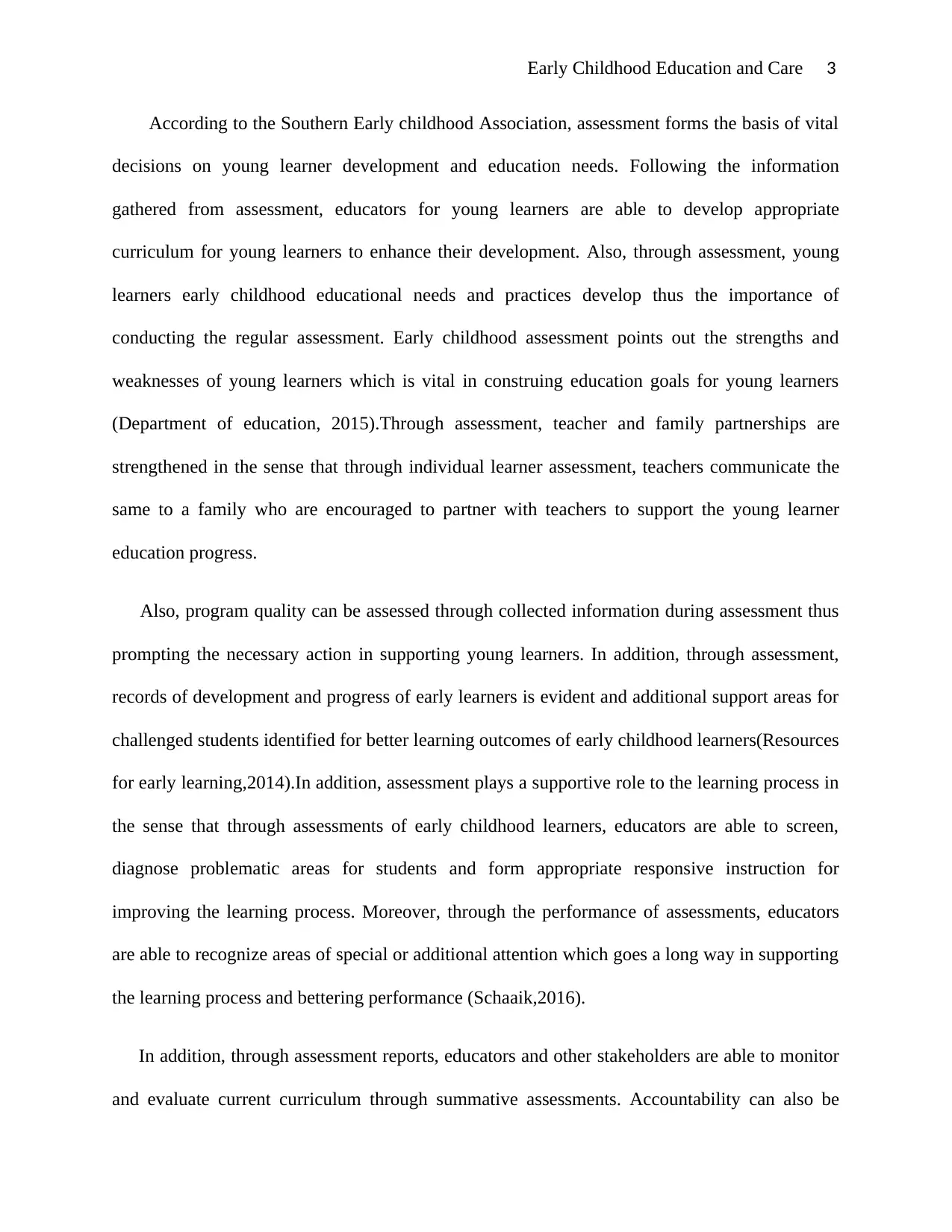
Early Childhood Education and Care 3
According to the Southern Early childhood Association, assessment forms the basis of vital
decisions on young learner development and education needs. Following the information
gathered from assessment, educators for young learners are able to develop appropriate
curriculum for young learners to enhance their development. Also, through assessment, young
learners early childhood educational needs and practices develop thus the importance of
conducting the regular assessment. Early childhood assessment points out the strengths and
weaknesses of young learners which is vital in construing education goals for young learners
(Department of education, 2015).Through assessment, teacher and family partnerships are
strengthened in the sense that through individual learner assessment, teachers communicate the
same to a family who are encouraged to partner with teachers to support the young learner
education progress.
Also, program quality can be assessed through collected information during assessment thus
prompting the necessary action in supporting young learners. In addition, through assessment,
records of development and progress of early learners is evident and additional support areas for
challenged students identified for better learning outcomes of early childhood learners(Resources
for early learning,2014).In addition, assessment plays a supportive role to the learning process in
the sense that through assessments of early childhood learners, educators are able to screen,
diagnose problematic areas for students and form appropriate responsive instruction for
improving the learning process. Moreover, through the performance of assessments, educators
are able to recognize areas of special or additional attention which goes a long way in supporting
the learning process and bettering performance (Schaaik,2016).
In addition, through assessment reports, educators and other stakeholders are able to monitor
and evaluate current curriculum through summative assessments. Accountability can also be
According to the Southern Early childhood Association, assessment forms the basis of vital
decisions on young learner development and education needs. Following the information
gathered from assessment, educators for young learners are able to develop appropriate
curriculum for young learners to enhance their development. Also, through assessment, young
learners early childhood educational needs and practices develop thus the importance of
conducting the regular assessment. Early childhood assessment points out the strengths and
weaknesses of young learners which is vital in construing education goals for young learners
(Department of education, 2015).Through assessment, teacher and family partnerships are
strengthened in the sense that through individual learner assessment, teachers communicate the
same to a family who are encouraged to partner with teachers to support the young learner
education progress.
Also, program quality can be assessed through collected information during assessment thus
prompting the necessary action in supporting young learners. In addition, through assessment,
records of development and progress of early learners is evident and additional support areas for
challenged students identified for better learning outcomes of early childhood learners(Resources
for early learning,2014).In addition, assessment plays a supportive role to the learning process in
the sense that through assessments of early childhood learners, educators are able to screen,
diagnose problematic areas for students and form appropriate responsive instruction for
improving the learning process. Moreover, through the performance of assessments, educators
are able to recognize areas of special or additional attention which goes a long way in supporting
the learning process and bettering performance (Schaaik,2016).
In addition, through assessment reports, educators and other stakeholders are able to monitor
and evaluate current curriculum through summative assessments. Accountability can also be
⊘ This is a preview!⊘
Do you want full access?
Subscribe today to unlock all pages.

Trusted by 1+ million students worldwide
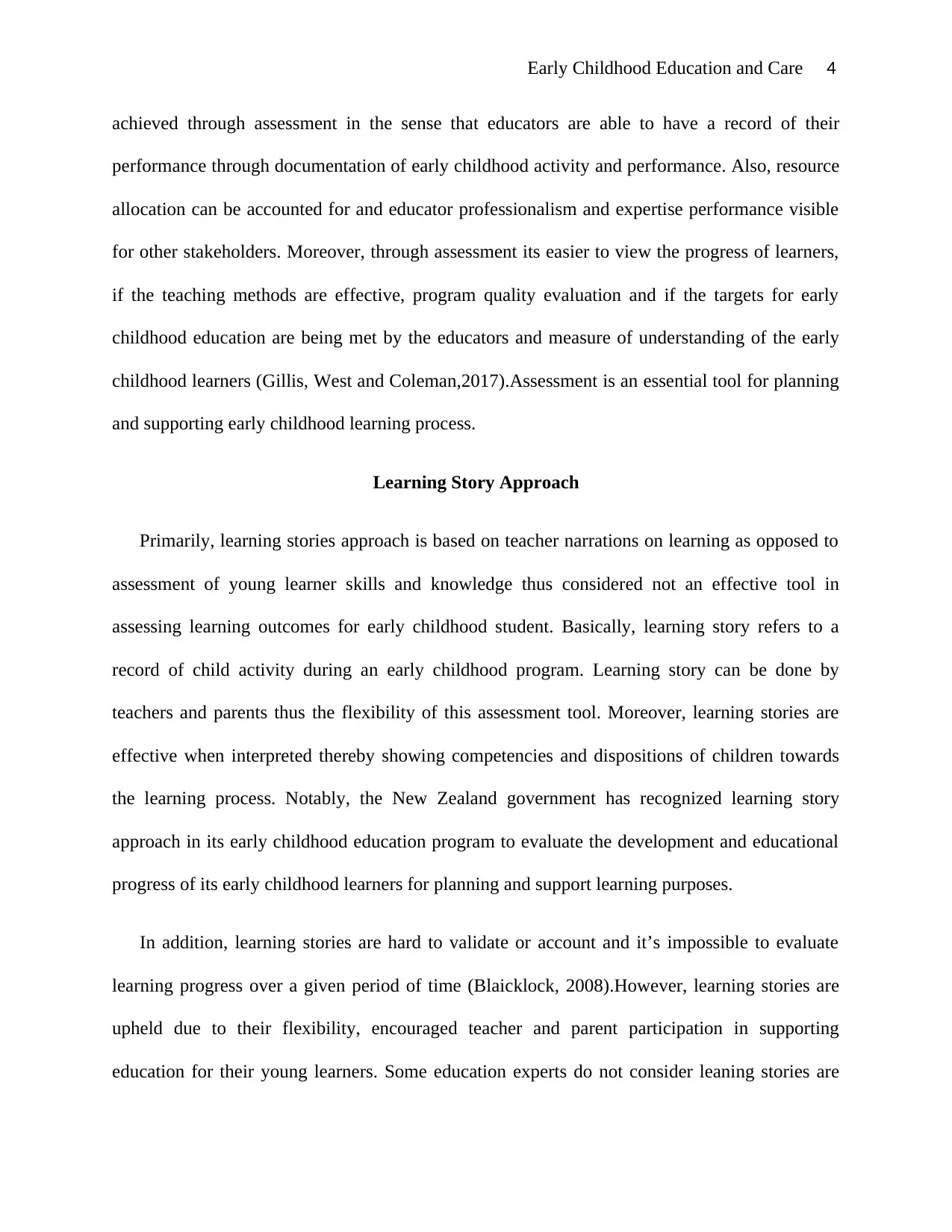
Early Childhood Education and Care 4
achieved through assessment in the sense that educators are able to have a record of their
performance through documentation of early childhood activity and performance. Also, resource
allocation can be accounted for and educator professionalism and expertise performance visible
for other stakeholders. Moreover, through assessment its easier to view the progress of learners,
if the teaching methods are effective, program quality evaluation and if the targets for early
childhood education are being met by the educators and measure of understanding of the early
childhood learners (Gillis, West and Coleman,2017).Assessment is an essential tool for planning
and supporting early childhood learning process.
Learning Story Approach
Primarily, learning stories approach is based on teacher narrations on learning as opposed to
assessment of young learner skills and knowledge thus considered not an effective tool in
assessing learning outcomes for early childhood student. Basically, learning story refers to a
record of child activity during an early childhood program. Learning story can be done by
teachers and parents thus the flexibility of this assessment tool. Moreover, learning stories are
effective when interpreted thereby showing competencies and dispositions of children towards
the learning process. Notably, the New Zealand government has recognized learning story
approach in its early childhood education program to evaluate the development and educational
progress of its early childhood learners for planning and support learning purposes.
In addition, learning stories are hard to validate or account and it’s impossible to evaluate
learning progress over a given period of time (Blaicklock, 2008).However, learning stories are
upheld due to their flexibility, encouraged teacher and parent participation in supporting
education for their young learners. Some education experts do not consider leaning stories are
achieved through assessment in the sense that educators are able to have a record of their
performance through documentation of early childhood activity and performance. Also, resource
allocation can be accounted for and educator professionalism and expertise performance visible
for other stakeholders. Moreover, through assessment its easier to view the progress of learners,
if the teaching methods are effective, program quality evaluation and if the targets for early
childhood education are being met by the educators and measure of understanding of the early
childhood learners (Gillis, West and Coleman,2017).Assessment is an essential tool for planning
and supporting early childhood learning process.
Learning Story Approach
Primarily, learning stories approach is based on teacher narrations on learning as opposed to
assessment of young learner skills and knowledge thus considered not an effective tool in
assessing learning outcomes for early childhood student. Basically, learning story refers to a
record of child activity during an early childhood program. Learning story can be done by
teachers and parents thus the flexibility of this assessment tool. Moreover, learning stories are
effective when interpreted thereby showing competencies and dispositions of children towards
the learning process. Notably, the New Zealand government has recognized learning story
approach in its early childhood education program to evaluate the development and educational
progress of its early childhood learners for planning and support learning purposes.
In addition, learning stories are hard to validate or account and it’s impossible to evaluate
learning progress over a given period of time (Blaicklock, 2008).However, learning stories are
upheld due to their flexibility, encouraged teacher and parent participation in supporting
education for their young learners. Some education experts do not consider leaning stories are
Paraphrase This Document
Need a fresh take? Get an instant paraphrase of this document with our AI Paraphraser
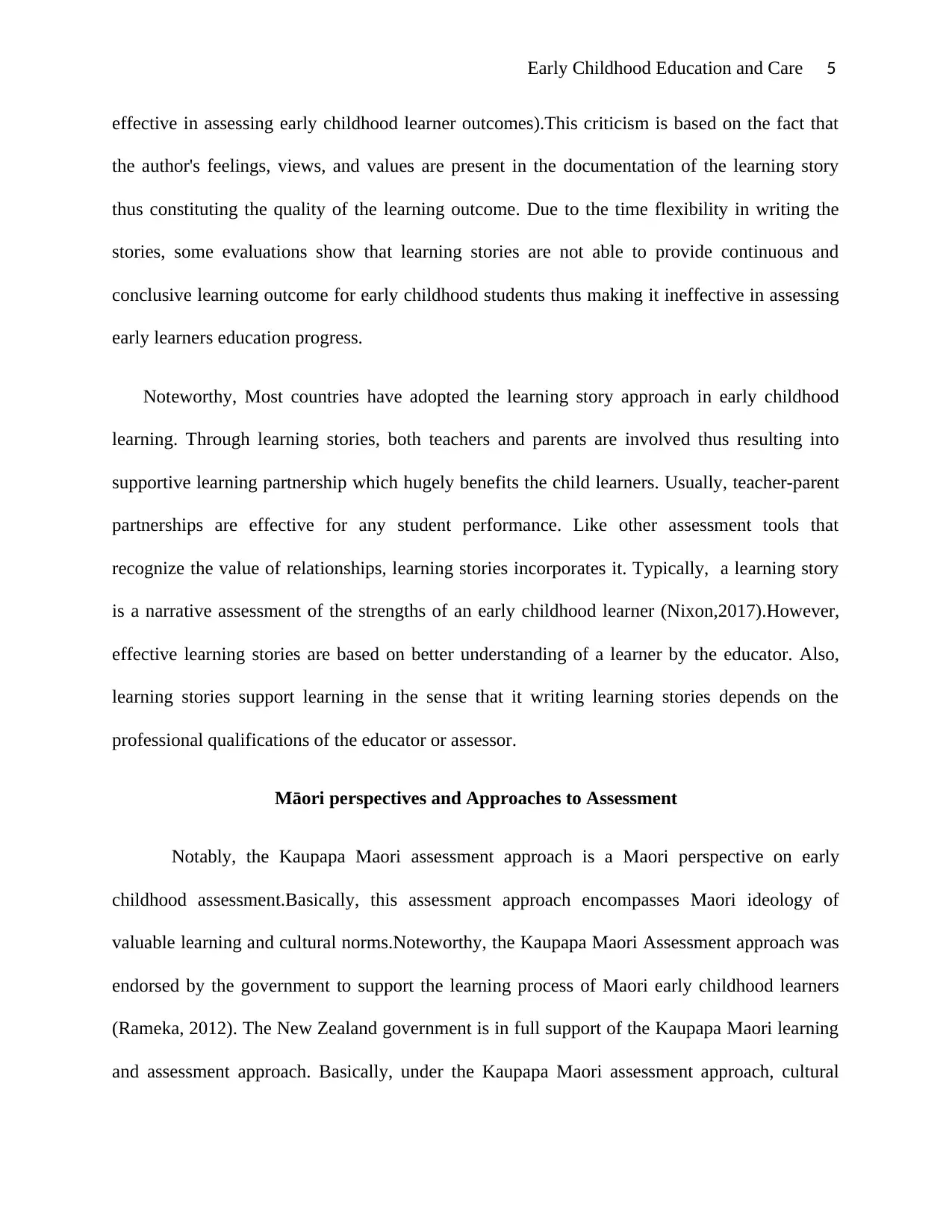
Early Childhood Education and Care 5
effective in assessing early childhood learner outcomes).This criticism is based on the fact that
the author's feelings, views, and values are present in the documentation of the learning story
thus constituting the quality of the learning outcome. Due to the time flexibility in writing the
stories, some evaluations show that learning stories are not able to provide continuous and
conclusive learning outcome for early childhood students thus making it ineffective in assessing
early learners education progress.
Noteworthy, Most countries have adopted the learning story approach in early childhood
learning. Through learning stories, both teachers and parents are involved thus resulting into
supportive learning partnership which hugely benefits the child learners. Usually, teacher-parent
partnerships are effective for any student performance. Like other assessment tools that
recognize the value of relationships, learning stories incorporates it. Typically, a learning story
is a narrative assessment of the strengths of an early childhood learner (Nixon,2017).However,
effective learning stories are based on better understanding of a learner by the educator. Also,
learning stories support learning in the sense that it writing learning stories depends on the
professional qualifications of the educator or assessor.
Māori perspectives and Approaches to Assessment
Notably, the Kaupapa Maori assessment approach is a Maori perspective on early
childhood assessment.Basically, this assessment approach encompasses Maori ideology of
valuable learning and cultural norms.Noteworthy, the Kaupapa Maori Assessment approach was
endorsed by the government to support the learning process of Maori early childhood learners
(Rameka, 2012). The New Zealand government is in full support of the Kaupapa Maori learning
and assessment approach. Basically, under the Kaupapa Maori assessment approach, cultural
effective in assessing early childhood learner outcomes).This criticism is based on the fact that
the author's feelings, views, and values are present in the documentation of the learning story
thus constituting the quality of the learning outcome. Due to the time flexibility in writing the
stories, some evaluations show that learning stories are not able to provide continuous and
conclusive learning outcome for early childhood students thus making it ineffective in assessing
early learners education progress.
Noteworthy, Most countries have adopted the learning story approach in early childhood
learning. Through learning stories, both teachers and parents are involved thus resulting into
supportive learning partnership which hugely benefits the child learners. Usually, teacher-parent
partnerships are effective for any student performance. Like other assessment tools that
recognize the value of relationships, learning stories incorporates it. Typically, a learning story
is a narrative assessment of the strengths of an early childhood learner (Nixon,2017).However,
effective learning stories are based on better understanding of a learner by the educator. Also,
learning stories support learning in the sense that it writing learning stories depends on the
professional qualifications of the educator or assessor.
Māori perspectives and Approaches to Assessment
Notably, the Kaupapa Maori assessment approach is a Maori perspective on early
childhood assessment.Basically, this assessment approach encompasses Maori ideology of
valuable learning and cultural norms.Noteworthy, the Kaupapa Maori Assessment approach was
endorsed by the government to support the learning process of Maori early childhood learners
(Rameka, 2012). The New Zealand government is in full support of the Kaupapa Maori learning
and assessment approach. Basically, under the Kaupapa Maori assessment approach, cultural
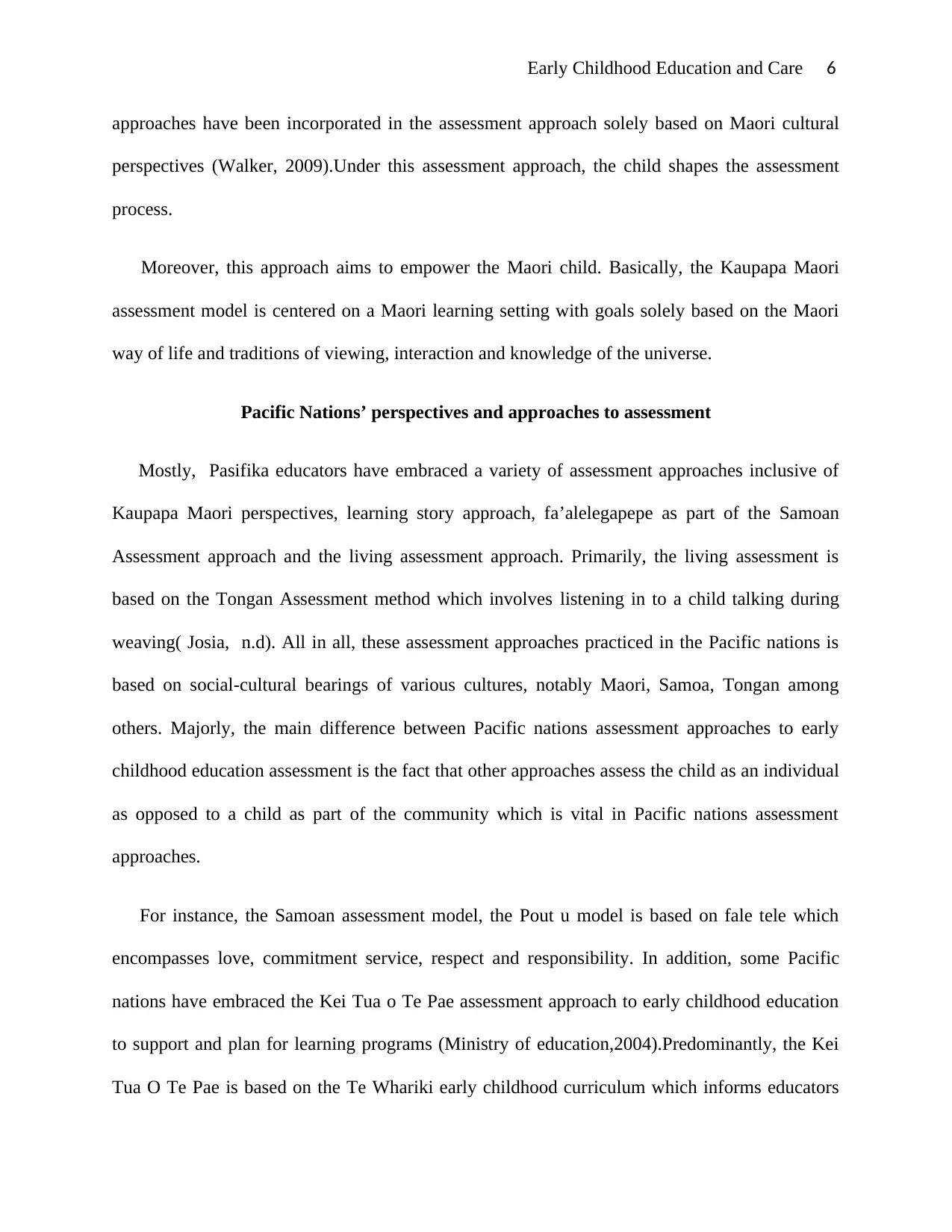
Early Childhood Education and Care 6
approaches have been incorporated in the assessment approach solely based on Maori cultural
perspectives (Walker, 2009).Under this assessment approach, the child shapes the assessment
process.
Moreover, this approach aims to empower the Maori child. Basically, the Kaupapa Maori
assessment model is centered on a Maori learning setting with goals solely based on the Maori
way of life and traditions of viewing, interaction and knowledge of the universe.
Pacific Nations’ perspectives and approaches to assessment
Mostly, Pasifika educators have embraced a variety of assessment approaches inclusive of
Kaupapa Maori perspectives, learning story approach, fa’alelegapepe as part of the Samoan
Assessment approach and the living assessment approach. Primarily, the living assessment is
based on the Tongan Assessment method which involves listening in to a child talking during
weaving( Josia, n.d). All in all, these assessment approaches practiced in the Pacific nations is
based on social-cultural bearings of various cultures, notably Maori, Samoa, Tongan among
others. Majorly, the main difference between Pacific nations assessment approaches to early
childhood education assessment is the fact that other approaches assess the child as an individual
as opposed to a child as part of the community which is vital in Pacific nations assessment
approaches.
For instance, the Samoan assessment model, the Pout u model is based on fale tele which
encompasses love, commitment service, respect and responsibility. In addition, some Pacific
nations have embraced the Kei Tua o Te Pae assessment approach to early childhood education
to support and plan for learning programs (Ministry of education,2004).Predominantly, the Kei
Tua O Te Pae is based on the Te Whariki early childhood curriculum which informs educators
approaches have been incorporated in the assessment approach solely based on Maori cultural
perspectives (Walker, 2009).Under this assessment approach, the child shapes the assessment
process.
Moreover, this approach aims to empower the Maori child. Basically, the Kaupapa Maori
assessment model is centered on a Maori learning setting with goals solely based on the Maori
way of life and traditions of viewing, interaction and knowledge of the universe.
Pacific Nations’ perspectives and approaches to assessment
Mostly, Pasifika educators have embraced a variety of assessment approaches inclusive of
Kaupapa Maori perspectives, learning story approach, fa’alelegapepe as part of the Samoan
Assessment approach and the living assessment approach. Primarily, the living assessment is
based on the Tongan Assessment method which involves listening in to a child talking during
weaving( Josia, n.d). All in all, these assessment approaches practiced in the Pacific nations is
based on social-cultural bearings of various cultures, notably Maori, Samoa, Tongan among
others. Majorly, the main difference between Pacific nations assessment approaches to early
childhood education assessment is the fact that other approaches assess the child as an individual
as opposed to a child as part of the community which is vital in Pacific nations assessment
approaches.
For instance, the Samoan assessment model, the Pout u model is based on fale tele which
encompasses love, commitment service, respect and responsibility. In addition, some Pacific
nations have embraced the Kei Tua o Te Pae assessment approach to early childhood education
to support and plan for learning programs (Ministry of education,2004).Predominantly, the Kei
Tua O Te Pae is based on the Te Whariki early childhood curriculum which informs educators
⊘ This is a preview!⊘
Do you want full access?
Subscribe today to unlock all pages.

Trusted by 1+ million students worldwide
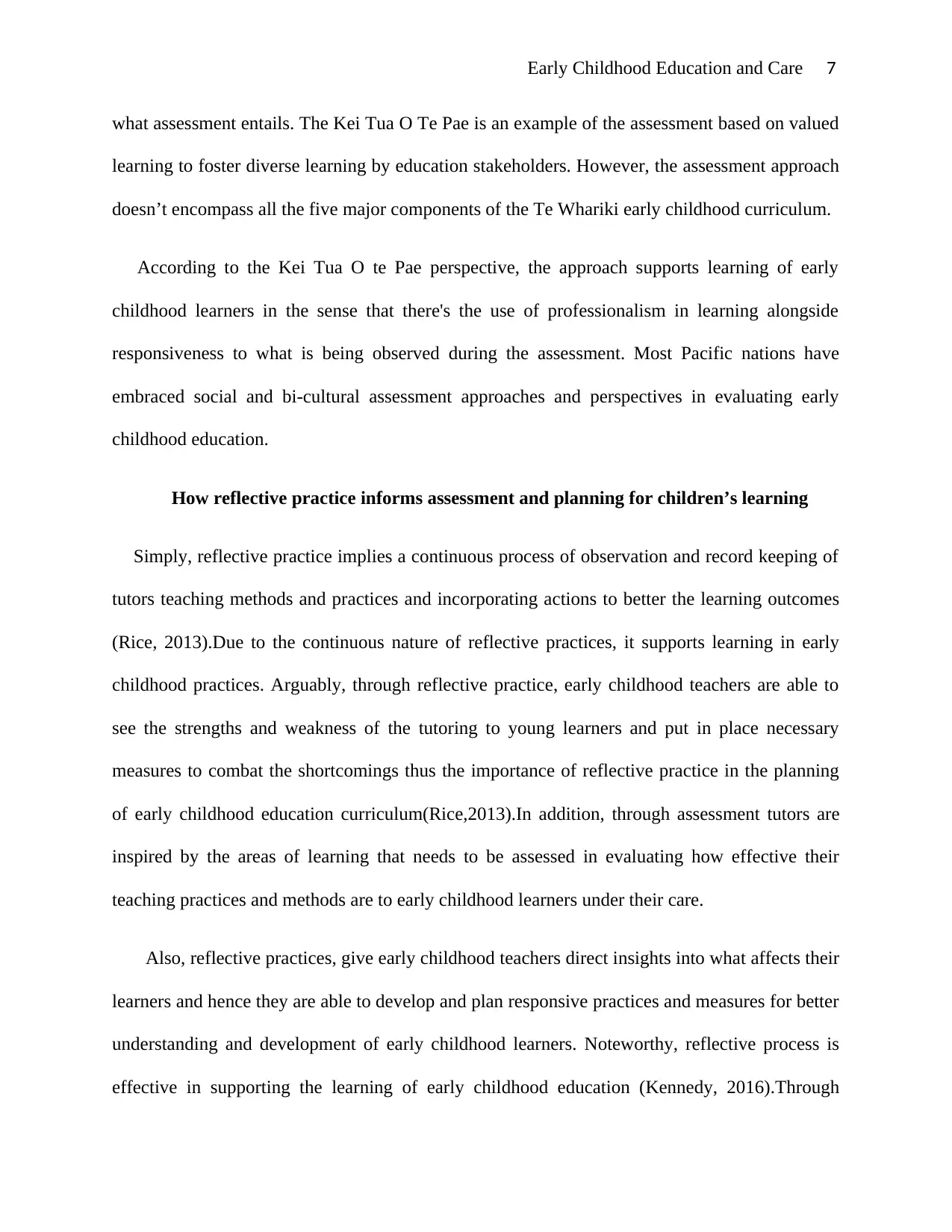
Early Childhood Education and Care 7
what assessment entails. The Kei Tua O Te Pae is an example of the assessment based on valued
learning to foster diverse learning by education stakeholders. However, the assessment approach
doesn’t encompass all the five major components of the Te Whariki early childhood curriculum.
According to the Kei Tua O te Pae perspective, the approach supports learning of early
childhood learners in the sense that there's the use of professionalism in learning alongside
responsiveness to what is being observed during the assessment. Most Pacific nations have
embraced social and bi-cultural assessment approaches and perspectives in evaluating early
childhood education.
How reflective practice informs assessment and planning for children’s learning
Simply, reflective practice implies a continuous process of observation and record keeping of
tutors teaching methods and practices and incorporating actions to better the learning outcomes
(Rice, 2013).Due to the continuous nature of reflective practices, it supports learning in early
childhood practices. Arguably, through reflective practice, early childhood teachers are able to
see the strengths and weakness of the tutoring to young learners and put in place necessary
measures to combat the shortcomings thus the importance of reflective practice in the planning
of early childhood education curriculum(Rice,2013).In addition, through assessment tutors are
inspired by the areas of learning that needs to be assessed in evaluating how effective their
teaching practices and methods are to early childhood learners under their care.
Also, reflective practices, give early childhood teachers direct insights into what affects their
learners and hence they are able to develop and plan responsive practices and measures for better
understanding and development of early childhood learners. Noteworthy, reflective process is
effective in supporting the learning of early childhood education (Kennedy, 2016).Through
what assessment entails. The Kei Tua O Te Pae is an example of the assessment based on valued
learning to foster diverse learning by education stakeholders. However, the assessment approach
doesn’t encompass all the five major components of the Te Whariki early childhood curriculum.
According to the Kei Tua O te Pae perspective, the approach supports learning of early
childhood learners in the sense that there's the use of professionalism in learning alongside
responsiveness to what is being observed during the assessment. Most Pacific nations have
embraced social and bi-cultural assessment approaches and perspectives in evaluating early
childhood education.
How reflective practice informs assessment and planning for children’s learning
Simply, reflective practice implies a continuous process of observation and record keeping of
tutors teaching methods and practices and incorporating actions to better the learning outcomes
(Rice, 2013).Due to the continuous nature of reflective practices, it supports learning in early
childhood practices. Arguably, through reflective practice, early childhood teachers are able to
see the strengths and weakness of the tutoring to young learners and put in place necessary
measures to combat the shortcomings thus the importance of reflective practice in the planning
of early childhood education curriculum(Rice,2013).In addition, through assessment tutors are
inspired by the areas of learning that needs to be assessed in evaluating how effective their
teaching practices and methods are to early childhood learners under their care.
Also, reflective practices, give early childhood teachers direct insights into what affects their
learners and hence they are able to develop and plan responsive practices and measures for better
understanding and development of early childhood learners. Noteworthy, reflective process is
effective in supporting the learning of early childhood education (Kennedy, 2016).Through
Paraphrase This Document
Need a fresh take? Get an instant paraphrase of this document with our AI Paraphraser
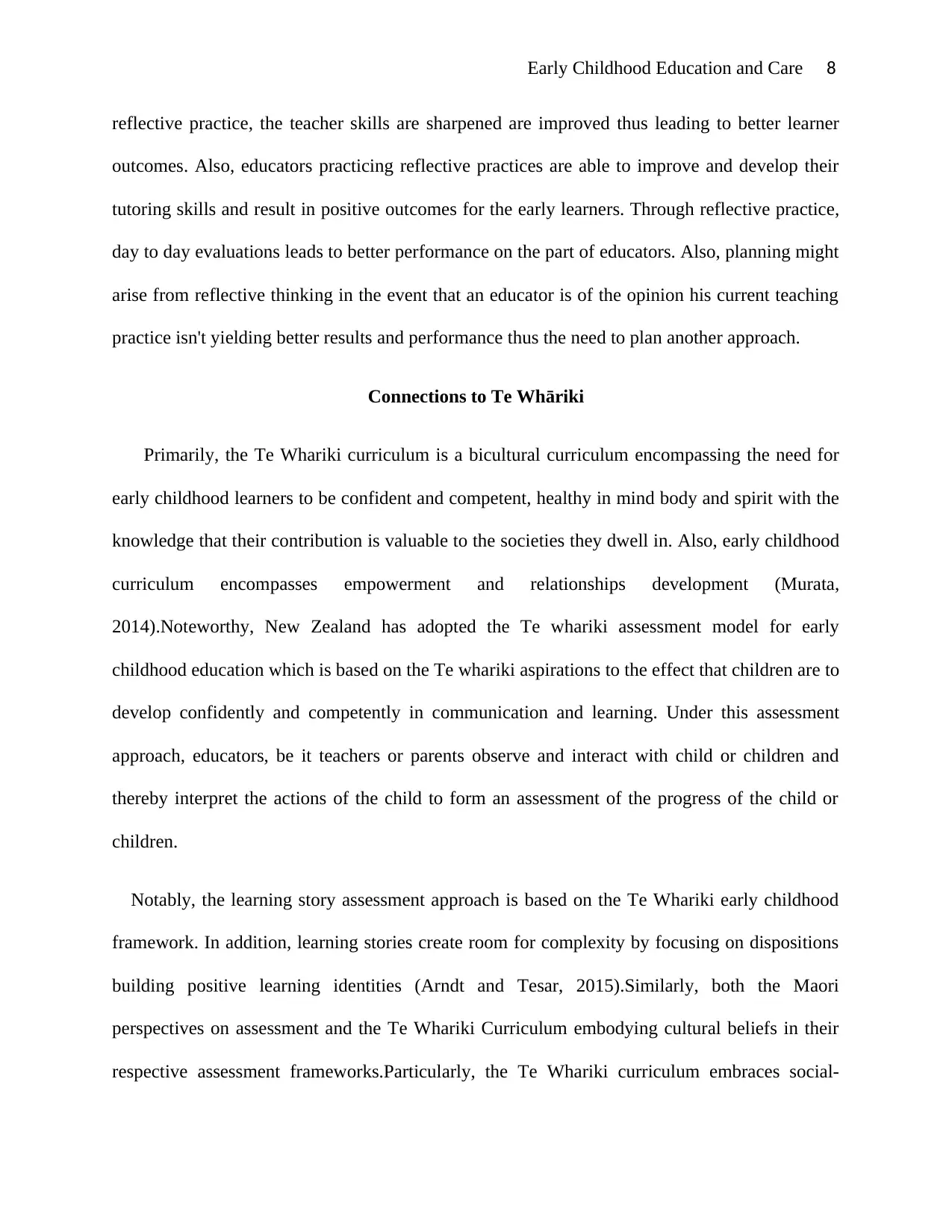
Early Childhood Education and Care 8
reflective practice, the teacher skills are sharpened are improved thus leading to better learner
outcomes. Also, educators practicing reflective practices are able to improve and develop their
tutoring skills and result in positive outcomes for the early learners. Through reflective practice,
day to day evaluations leads to better performance on the part of educators. Also, planning might
arise from reflective thinking in the event that an educator is of the opinion his current teaching
practice isn't yielding better results and performance thus the need to plan another approach.
Connections to Te Whāriki
Primarily, the Te Whariki curriculum is a bicultural curriculum encompassing the need for
early childhood learners to be confident and competent, healthy in mind body and spirit with the
knowledge that their contribution is valuable to the societies they dwell in. Also, early childhood
curriculum encompasses empowerment and relationships development (Murata,
2014).Noteworthy, New Zealand has adopted the Te whariki assessment model for early
childhood education which is based on the Te whariki aspirations to the effect that children are to
develop confidently and competently in communication and learning. Under this assessment
approach, educators, be it teachers or parents observe and interact with child or children and
thereby interpret the actions of the child to form an assessment of the progress of the child or
children.
Notably, the learning story assessment approach is based on the Te Whariki early childhood
framework. In addition, learning stories create room for complexity by focusing on dispositions
building positive learning identities (Arndt and Tesar, 2015).Similarly, both the Maori
perspectives on assessment and the Te Whariki Curriculum embodying cultural beliefs in their
respective assessment frameworks.Particularly, the Te Whariki curriculum embraces social-
reflective practice, the teacher skills are sharpened are improved thus leading to better learner
outcomes. Also, educators practicing reflective practices are able to improve and develop their
tutoring skills and result in positive outcomes for the early learners. Through reflective practice,
day to day evaluations leads to better performance on the part of educators. Also, planning might
arise from reflective thinking in the event that an educator is of the opinion his current teaching
practice isn't yielding better results and performance thus the need to plan another approach.
Connections to Te Whāriki
Primarily, the Te Whariki curriculum is a bicultural curriculum encompassing the need for
early childhood learners to be confident and competent, healthy in mind body and spirit with the
knowledge that their contribution is valuable to the societies they dwell in. Also, early childhood
curriculum encompasses empowerment and relationships development (Murata,
2014).Noteworthy, New Zealand has adopted the Te whariki assessment model for early
childhood education which is based on the Te whariki aspirations to the effect that children are to
develop confidently and competently in communication and learning. Under this assessment
approach, educators, be it teachers or parents observe and interact with child or children and
thereby interpret the actions of the child to form an assessment of the progress of the child or
children.
Notably, the learning story assessment approach is based on the Te Whariki early childhood
framework. In addition, learning stories create room for complexity by focusing on dispositions
building positive learning identities (Arndt and Tesar, 2015).Similarly, both the Maori
perspectives on assessment and the Te Whariki Curriculum embodying cultural beliefs in their
respective assessment frameworks.Particularly, the Te Whariki curriculum embraces social-
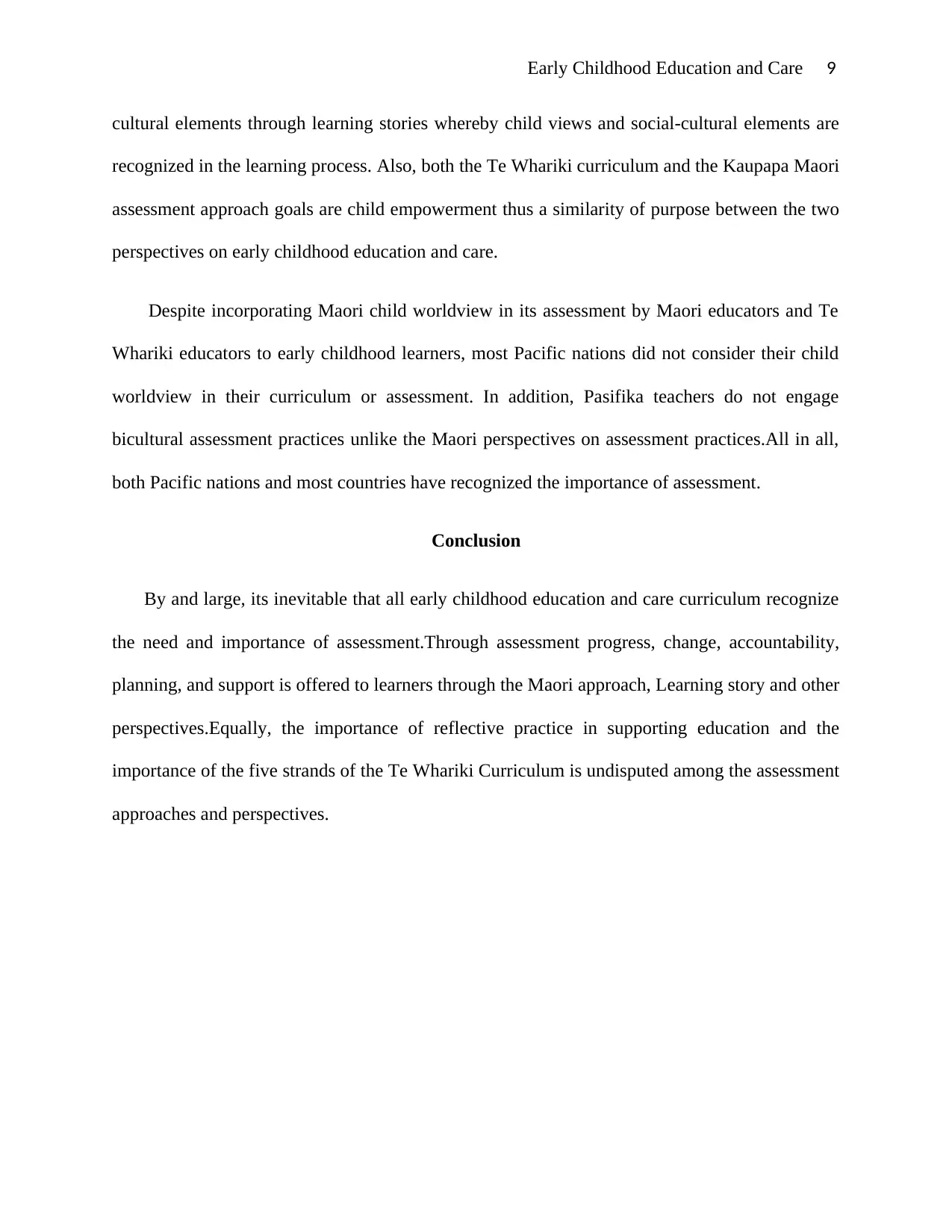
Early Childhood Education and Care 9
cultural elements through learning stories whereby child views and social-cultural elements are
recognized in the learning process. Also, both the Te Whariki curriculum and the Kaupapa Maori
assessment approach goals are child empowerment thus a similarity of purpose between the two
perspectives on early childhood education and care.
Despite incorporating Maori child worldview in its assessment by Maori educators and Te
Whariki educators to early childhood learners, most Pacific nations did not consider their child
worldview in their curriculum or assessment. In addition, Pasifika teachers do not engage
bicultural assessment practices unlike the Maori perspectives on assessment practices.All in all,
both Pacific nations and most countries have recognized the importance of assessment.
Conclusion
By and large, its inevitable that all early childhood education and care curriculum recognize
the need and importance of assessment.Through assessment progress, change, accountability,
planning, and support is offered to learners through the Maori approach, Learning story and other
perspectives.Equally, the importance of reflective practice in supporting education and the
importance of the five strands of the Te Whariki Curriculum is undisputed among the assessment
approaches and perspectives.
cultural elements through learning stories whereby child views and social-cultural elements are
recognized in the learning process. Also, both the Te Whariki curriculum and the Kaupapa Maori
assessment approach goals are child empowerment thus a similarity of purpose between the two
perspectives on early childhood education and care.
Despite incorporating Maori child worldview in its assessment by Maori educators and Te
Whariki educators to early childhood learners, most Pacific nations did not consider their child
worldview in their curriculum or assessment. In addition, Pasifika teachers do not engage
bicultural assessment practices unlike the Maori perspectives on assessment practices.All in all,
both Pacific nations and most countries have recognized the importance of assessment.
Conclusion
By and large, its inevitable that all early childhood education and care curriculum recognize
the need and importance of assessment.Through assessment progress, change, accountability,
planning, and support is offered to learners through the Maori approach, Learning story and other
perspectives.Equally, the importance of reflective practice in supporting education and the
importance of the five strands of the Te Whariki Curriculum is undisputed among the assessment
approaches and perspectives.
⊘ This is a preview!⊘
Do you want full access?
Subscribe today to unlock all pages.

Trusted by 1+ million students worldwide
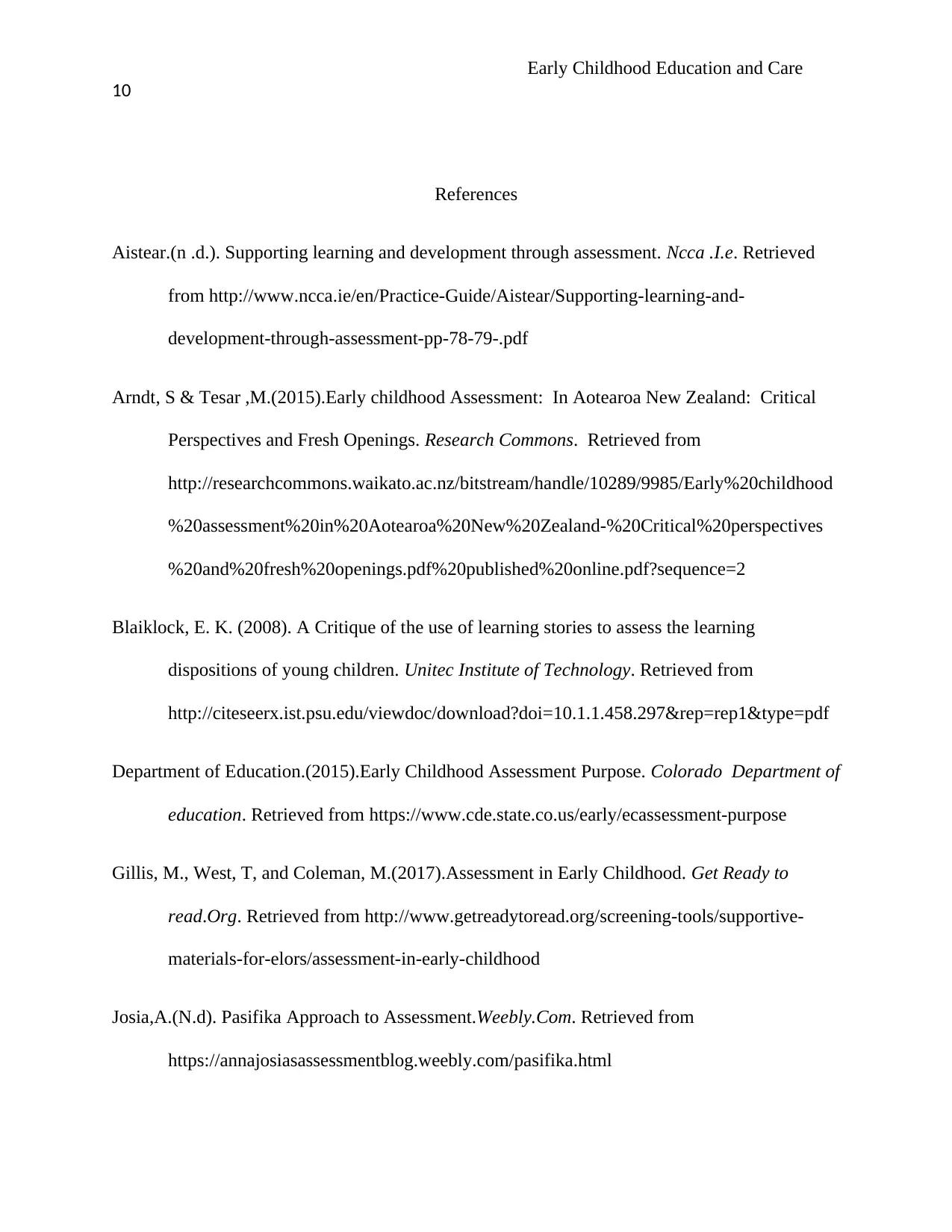
Early Childhood Education and Care
10
References
Aistear.(n .d.). Supporting learning and development through assessment. Ncca .I.e. Retrieved
from http://www.ncca.ie/en/Practice-Guide/Aistear/Supporting-learning-and-
development-through-assessment-pp-78-79-.pdf
Arndt, S & Tesar ,M.(2015).Early childhood Assessment: In Aotearoa New Zealand: Critical
Perspectives and Fresh Openings. Research Commons. Retrieved from
http://researchcommons.waikato.ac.nz/bitstream/handle/10289/9985/Early%20childhood
%20assessment%20in%20Aotearoa%20New%20Zealand-%20Critical%20perspectives
%20and%20fresh%20openings.pdf%20published%20online.pdf?sequence=2
Blaiklock, E. K. (2008). A Critique of the use of learning stories to assess the learning
dispositions of young children. Unitec Institute of Technology. Retrieved from
http://citeseerx.ist.psu.edu/viewdoc/download?doi=10.1.1.458.297&rep=rep1&type=pdf
Department of Education.(2015).Early Childhood Assessment Purpose. Colorado Department of
education. Retrieved from https://www.cde.state.co.us/early/ecassessment-purpose
Gillis, M., West, T, and Coleman, M.(2017).Assessment in Early Childhood. Get Ready to
read.Org. Retrieved from http://www.getreadytoread.org/screening-tools/supportive-
materials-for-elors/assessment-in-early-childhood
Josia,A.(N.d). Pasifika Approach to Assessment.Weebly.Com. Retrieved from
https://annajosiasassessmentblog.weebly.com/pasifika.html
10
References
Aistear.(n .d.). Supporting learning and development through assessment. Ncca .I.e. Retrieved
from http://www.ncca.ie/en/Practice-Guide/Aistear/Supporting-learning-and-
development-through-assessment-pp-78-79-.pdf
Arndt, S & Tesar ,M.(2015).Early childhood Assessment: In Aotearoa New Zealand: Critical
Perspectives and Fresh Openings. Research Commons. Retrieved from
http://researchcommons.waikato.ac.nz/bitstream/handle/10289/9985/Early%20childhood
%20assessment%20in%20Aotearoa%20New%20Zealand-%20Critical%20perspectives
%20and%20fresh%20openings.pdf%20published%20online.pdf?sequence=2
Blaiklock, E. K. (2008). A Critique of the use of learning stories to assess the learning
dispositions of young children. Unitec Institute of Technology. Retrieved from
http://citeseerx.ist.psu.edu/viewdoc/download?doi=10.1.1.458.297&rep=rep1&type=pdf
Department of Education.(2015).Early Childhood Assessment Purpose. Colorado Department of
education. Retrieved from https://www.cde.state.co.us/early/ecassessment-purpose
Gillis, M., West, T, and Coleman, M.(2017).Assessment in Early Childhood. Get Ready to
read.Org. Retrieved from http://www.getreadytoread.org/screening-tools/supportive-
materials-for-elors/assessment-in-early-childhood
Josia,A.(N.d). Pasifika Approach to Assessment.Weebly.Com. Retrieved from
https://annajosiasassessmentblog.weebly.com/pasifika.html
Paraphrase This Document
Need a fresh take? Get an instant paraphrase of this document with our AI Paraphraser
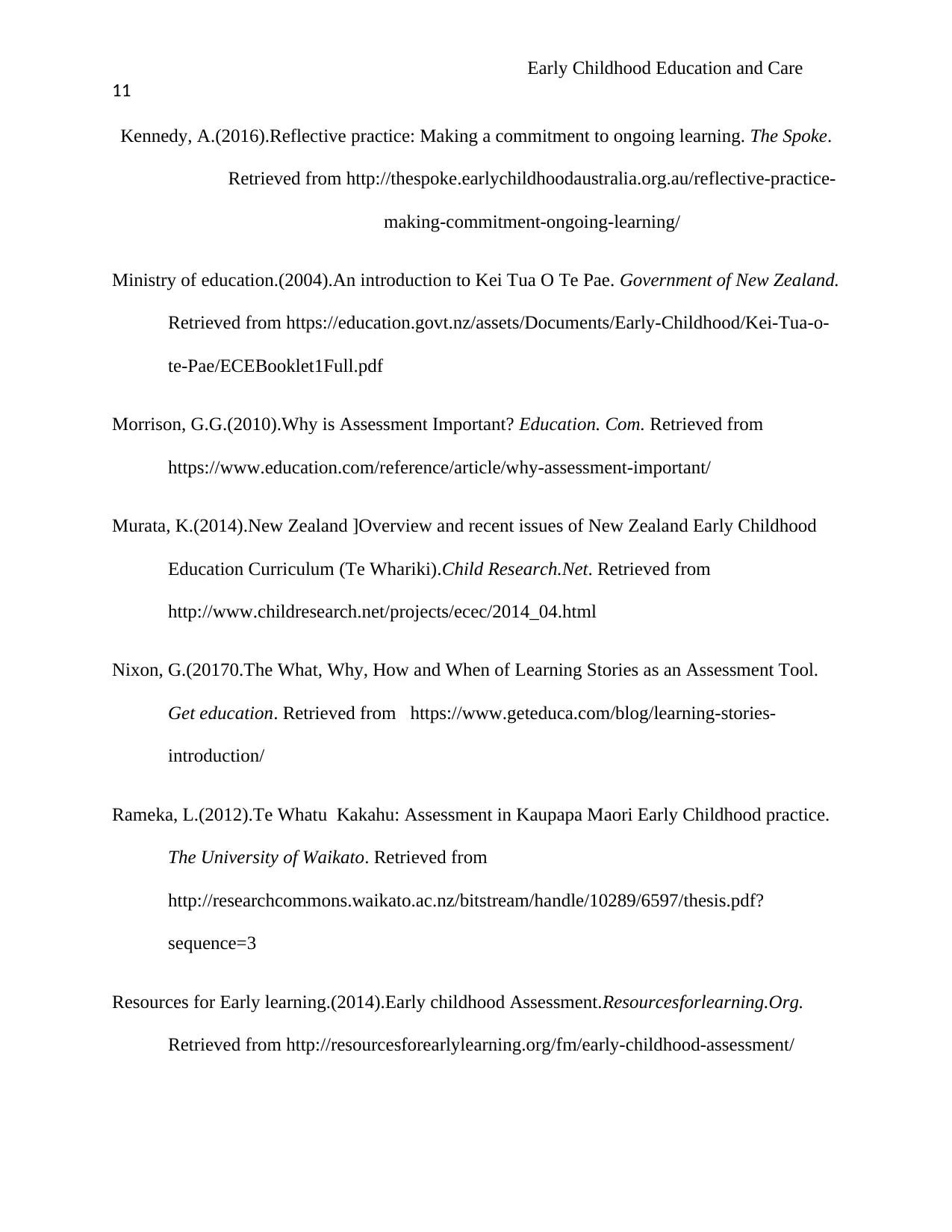
Early Childhood Education and Care
11
Kennedy, A.(2016).Reflective practice: Making a commitment to ongoing learning. The Spoke.
Retrieved from http://thespoke.earlychildhoodaustralia.org.au/reflective-practice-
making-commitment-ongoing-learning/
Ministry of education.(2004).An introduction to Kei Tua O Te Pae. Government of New Zealand.
Retrieved from https://education.govt.nz/assets/Documents/Early-Childhood/Kei-Tua-o-
te-Pae/ECEBooklet1Full.pdf
Morrison, G.G.(2010).Why is Assessment Important? Education. Com. Retrieved from
https://www.education.com/reference/article/why-assessment-important/
Murata, K.(2014).New Zealand ]Overview and recent issues of New Zealand Early Childhood
Education Curriculum (Te Whariki).Child Research.Net. Retrieved from
http://www.childresearch.net/projects/ecec/2014_04.html
Nixon, G.(20170.The What, Why, How and When of Learning Stories as an Assessment Tool.
Get education. Retrieved from https://www.geteduca.com/blog/learning-stories-
introduction/
Rameka, L.(2012).Te Whatu Kakahu: Assessment in Kaupapa Maori Early Childhood practice.
The University of Waikato. Retrieved from
http://researchcommons.waikato.ac.nz/bitstream/handle/10289/6597/thesis.pdf?
sequence=3
Resources for Early learning.(2014).Early childhood Assessment.Resourcesforlearning.Org.
Retrieved from http://resourcesforearlylearning.org/fm/early-childhood-assessment/
11
Kennedy, A.(2016).Reflective practice: Making a commitment to ongoing learning. The Spoke.
Retrieved from http://thespoke.earlychildhoodaustralia.org.au/reflective-practice-
making-commitment-ongoing-learning/
Ministry of education.(2004).An introduction to Kei Tua O Te Pae. Government of New Zealand.
Retrieved from https://education.govt.nz/assets/Documents/Early-Childhood/Kei-Tua-o-
te-Pae/ECEBooklet1Full.pdf
Morrison, G.G.(2010).Why is Assessment Important? Education. Com. Retrieved from
https://www.education.com/reference/article/why-assessment-important/
Murata, K.(2014).New Zealand ]Overview and recent issues of New Zealand Early Childhood
Education Curriculum (Te Whariki).Child Research.Net. Retrieved from
http://www.childresearch.net/projects/ecec/2014_04.html
Nixon, G.(20170.The What, Why, How and When of Learning Stories as an Assessment Tool.
Get education. Retrieved from https://www.geteduca.com/blog/learning-stories-
introduction/
Rameka, L.(2012).Te Whatu Kakahu: Assessment in Kaupapa Maori Early Childhood practice.
The University of Waikato. Retrieved from
http://researchcommons.waikato.ac.nz/bitstream/handle/10289/6597/thesis.pdf?
sequence=3
Resources for Early learning.(2014).Early childhood Assessment.Resourcesforlearning.Org.
Retrieved from http://resourcesforearlylearning.org/fm/early-childhood-assessment/
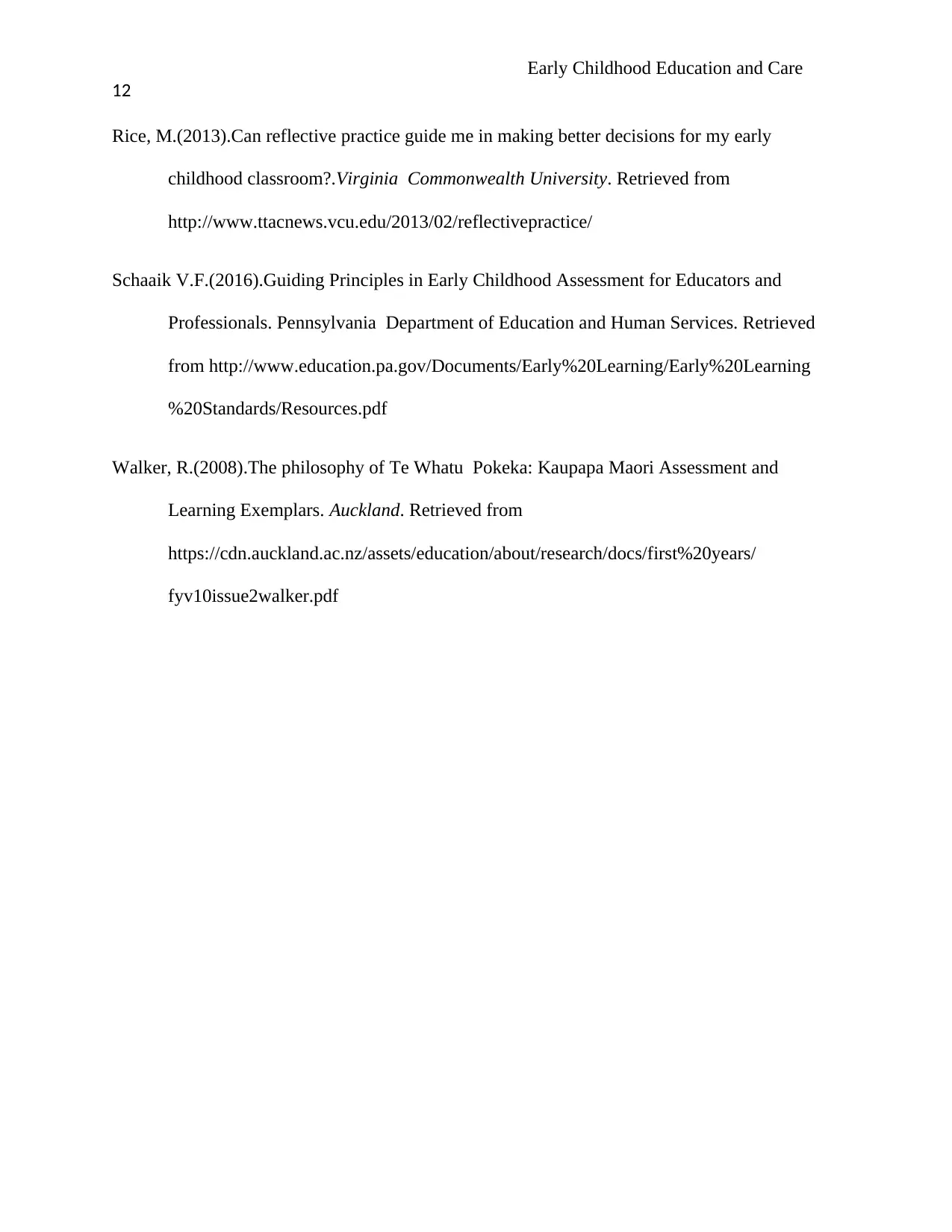
Early Childhood Education and Care
12
Rice, M.(2013).Can reflective practice guide me in making better decisions for my early
childhood classroom?.Virginia Commonwealth University. Retrieved from
http://www.ttacnews.vcu.edu/2013/02/reflectivepractice/
Schaaik V.F.(2016).Guiding Principles in Early Childhood Assessment for Educators and
Professionals. Pennsylvania Department of Education and Human Services. Retrieved
from http://www.education.pa.gov/Documents/Early%20Learning/Early%20Learning
%20Standards/Resources.pdf
Walker, R.(2008).The philosophy of Te Whatu Pokeka: Kaupapa Maori Assessment and
Learning Exemplars. Auckland. Retrieved from
https://cdn.auckland.ac.nz/assets/education/about/research/docs/first%20years/
fyv10issue2walker.pdf
12
Rice, M.(2013).Can reflective practice guide me in making better decisions for my early
childhood classroom?.Virginia Commonwealth University. Retrieved from
http://www.ttacnews.vcu.edu/2013/02/reflectivepractice/
Schaaik V.F.(2016).Guiding Principles in Early Childhood Assessment for Educators and
Professionals. Pennsylvania Department of Education and Human Services. Retrieved
from http://www.education.pa.gov/Documents/Early%20Learning/Early%20Learning
%20Standards/Resources.pdf
Walker, R.(2008).The philosophy of Te Whatu Pokeka: Kaupapa Maori Assessment and
Learning Exemplars. Auckland. Retrieved from
https://cdn.auckland.ac.nz/assets/education/about/research/docs/first%20years/
fyv10issue2walker.pdf
⊘ This is a preview!⊘
Do you want full access?
Subscribe today to unlock all pages.

Trusted by 1+ million students worldwide
1 out of 12
Related Documents
Your All-in-One AI-Powered Toolkit for Academic Success.
+13062052269
info@desklib.com
Available 24*7 on WhatsApp / Email
![[object Object]](/_next/static/media/star-bottom.7253800d.svg)
Unlock your academic potential
Copyright © 2020–2026 A2Z Services. All Rights Reserved. Developed and managed by ZUCOL.





